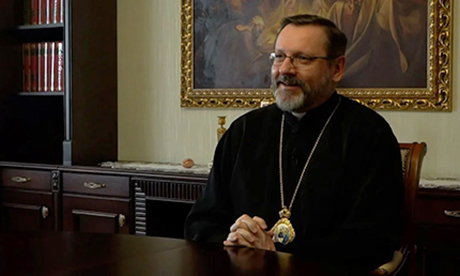The head of the Ukrainian Greek Catholic Church has pushed back on Pope Francis’ comments that Russia was possibly provoked by NATO into invading Ukraine.
“The gift of reason from the Holy Spirit is so necessary in today’s world so that the devil’s wiles do not deceive the human person,” said Archbishop Sviatoslav Shevchuk, head of the Ukrainian Greek Catholic Church.
Living in a “world of fakes, when what is desired is presented as real,” the gift of reason from the Holy Spirit is necessary so as not to “succumb to this apparent fog that the tempter wants to inspire in us, so that they could delve into reality and understand and know it correctly.”
The words seem to directly respond to comments made by several world leaders regarding the origin of the war.
Many, including Pope Francis, have argued that NATO had been “barking” at Russia’s door.
Shevchuk’s remarks were published on the official website of the Ukrainian Greek Catholic Church.
Recently, La Civiltà Cattolica published the full transcript of a conversation the pontiff had with editors of Jesuit-run media in May.
According to the transcript, Francis said, “There are no metaphysical good guys and bad guys here, in an abstract way.
“Something global is emerging, with elements that are very intertwined with each other.”
While condemning “the ferocity, the cruelty of Russian troops,” the pontiff also said that “we must not forget the real problems if we want them to be solved.” He singled out the armaments industry as one of several factors incentivising war.
He also quoted the opinion of a head of state he met several months before the start of the war who allegedly expressed his concern “about how NATO was moving.”
“I asked him why and he replied, ‘They are barking at Russia’s doorstep. And they don’t understand that the Russians are imperial and they don’t allow any foreign power to come near them’,” Francis said.
The pontiff added that this same person said, with the way NATO was acting, “the situation could lead to war.”
Shevchuk, who has known Pope Francis since attending the seminary in Buenos Aires when the pontiff was archbishop, contradicted these statements.
He said that “the causes of this war lie within Russia itself. And the Russian aggressor is trying to solve its internal problems with the help of external aggression. It projects its illnesses onto others and blames the whole world for them.
“We see and know, experiencing here in Ukraine, that Russia’s aggression against Ukraine is completely unprovoked,” he said.
“Any who think that some external cause has provoked Russia into military aggression are either themselves in the grip of Russian propaganda or are simply and deliberately deceiving the world.”
He closed the video by asking the faithful of the five-million-strong Eastern Rite church to pray for politicians, diplomats, church and religious figures to receive the gift of reason from the Holy Spirit.
Further pushback came overnight from Kyiv’s Latin rite bishop.
In a new interview Bishop Vitaliy Krivitskiy said that while a papal visit to Ukraine would be a source of hope, it is not currently possible due to security concerns and a growing distrust of the pontiff given some of his recent public remarks on the war.
Speaking to Avvenire, the official newspaper of the Italian bishops, Krivitskiy said, “The pope’s intention to be in the midst of a suffering people is for us Catholics, starting with me as a bishop, a reason for great hope.”
“We feel his closeness which is manifested through his repeated calls for a ceasefire and with concrete gestures that have also resulted in multiple dispatches of humanitarian aid. And then there is his constant prayer that involves the whole church. His visit would give us further courage,” he said.
Krivitskiy said it is not possible to estimate a timeline for when a potential papal visit to Ukraine might take place
Not only does the pope need a high level of security that would be challenging to provide given that most Ukrainian soldiers are deployed to the frontline in the fight against Russia, but “It should be added that, compared to the beginning of the conflict, a part of the population did not welcome the pope’s words, which were considered incorrect,” Krivitskiy said.
Though he did not refer to which statements the pope had made, it is well known that Pope Francis’s hesitancy to back the arming of Ukraine in its fight against Russia and his suggestion that NATO could have provoked the war have caused widespread controversy.
Sources
Additional reading
News category: World.




